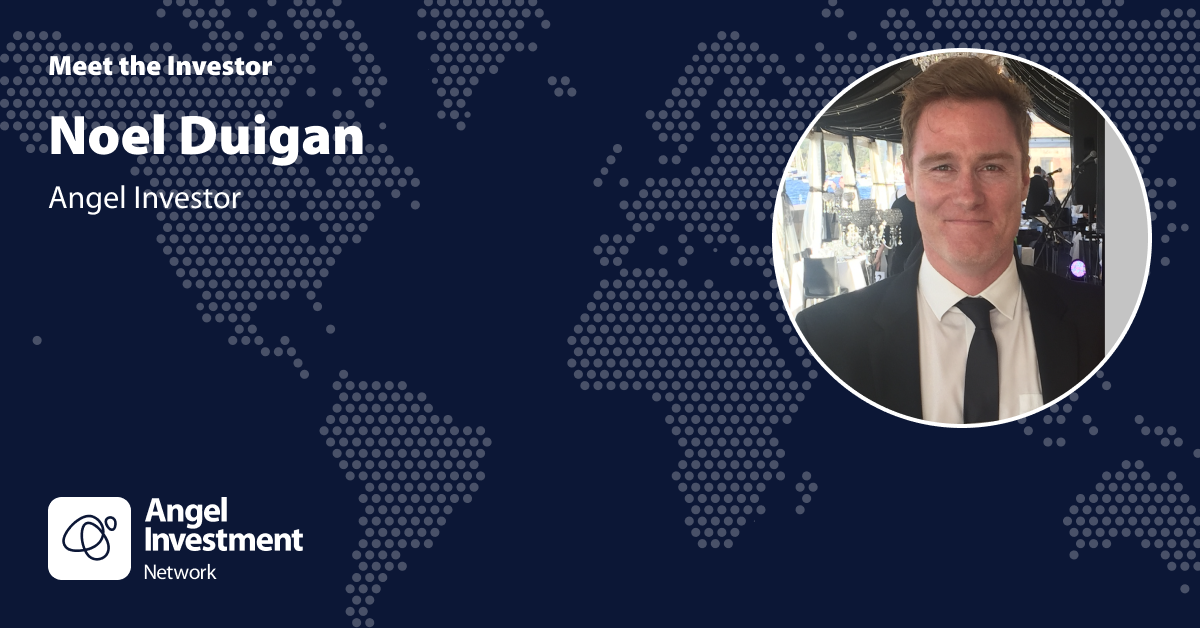‘Founders need to be passionate, driven, and fully committed in the longevity and future of their company.’ These are the words of experienced investor Noel Duigan describing what he expects from entrepreneurs pitching their business ideas. As someone who has personally invested in 12 businesses in the past year his advice is worth its weight in gold.
We are delighted Noel has given his time for our latest Meet The Investor interview. He discusses the reasons he invests, his typical ticket size, the red flags he looks out for, how founders should update investors and top tips for anyone raising for the first time.
What has led you to angel investing?
Independence mainly. I looked at it as a strategic step to gain financial independence and build a successful family office. Prior experience has helped me overcome a level of confidence required to interact with founders and CEO’s and not be afraid to ask the ‘stupid’ questions when I don’t know or understand something.
What do you invest in and at what stage? Any reason why you go for those investments?
I mainly lean towards tech and fintech due to the scalability. However I have also ventured into renewable energy. I prefer to get in at the seed round, but have also invested in Series A and B, as well as pre-seed. I think it’s being sensible with your portfolio and spreading the risk. Seed is attractive due to the low valuations and high potential for return, but with greater risks. So I hedge these with larger investments into Series A and B rounds, smaller returns and ‘usually’ a safer bet. But not always!
Do you invest with the head, the heart or the gut?
I think you really need to be paying attention to both the head and gut, I don’t tend to invest with my heart, at all. I will always look at the business case first to see the potential. If that checks the box and my gut is off then I pause and try to work out what the problem is. If I can’t find it, but still keep that feeling that something isn’t right, I don’t usually invest.
How often do you tend to invest per year and do you have a typical ticket size?
A few times a year, however the last year was quite busy with 12 investments. The sweet spot for me is £100k. However, I have a few at £200k and some at £50k. It really depends on the round, valuation and exit opportunities.
What are the key red flags when you are dealing with start-ups that you are potentially going to back?
Lack of experience of the founders, or their team is the main one. Often you are investing in the founders rather than the company. If the founders don’t have any skin in the game, that’s pause for consideration. Lack of traction in their space will often mean stalled growth and is a red flag. Have a look at their runway and burn rate, you don’t want it short and wide. That could spell either bad margins or high overheads.
How do you view your relationship with your investees? What is a good relationship?
At pre-seed/seed the company is smaller so the relationships tend to be more personal. You can offer networking support and help with growth. Whereas the later rounds you really are just a name on the cap table. Regardless of when you invested, a good relationship means consistent updates.
There is a challenge for founders to find a sweet spot between the management of their workload, and the stress it entails, alongside the expectations of their investors.
How often do you think founders should be updating their investors of their progress and by what method?
At a minimum a quarterly update should be emailed to investors covering progress (or lack of), metrics and financials.
What is your top tip for anyone raising investment for the first time? What gets you on board?
You need to be vested. A product or service driven from need, not greed will always win over investors. The market is over-saturated with people making a dash for cash off recycled ideas. Founders need to be passionate, driven, and fully committed in the longevity and future of their company. Hand sanitiser during a pandemic doesn’t cut it.
If you could offer an early investor one piece of business advice, what would it be?
Research. Research the company you want to invest in. Research the founders. Research their pitch deck, research also includes fact checking. Research their product, download their app, try it out, read the reviews. When you are not researching a company then start researching for self-education. As we used to say: “Time spent on reconnaissance is seldom wasted”.
Join the world’s largest angel investment network, where global angel investors meet the great businesses of tomorrow.

